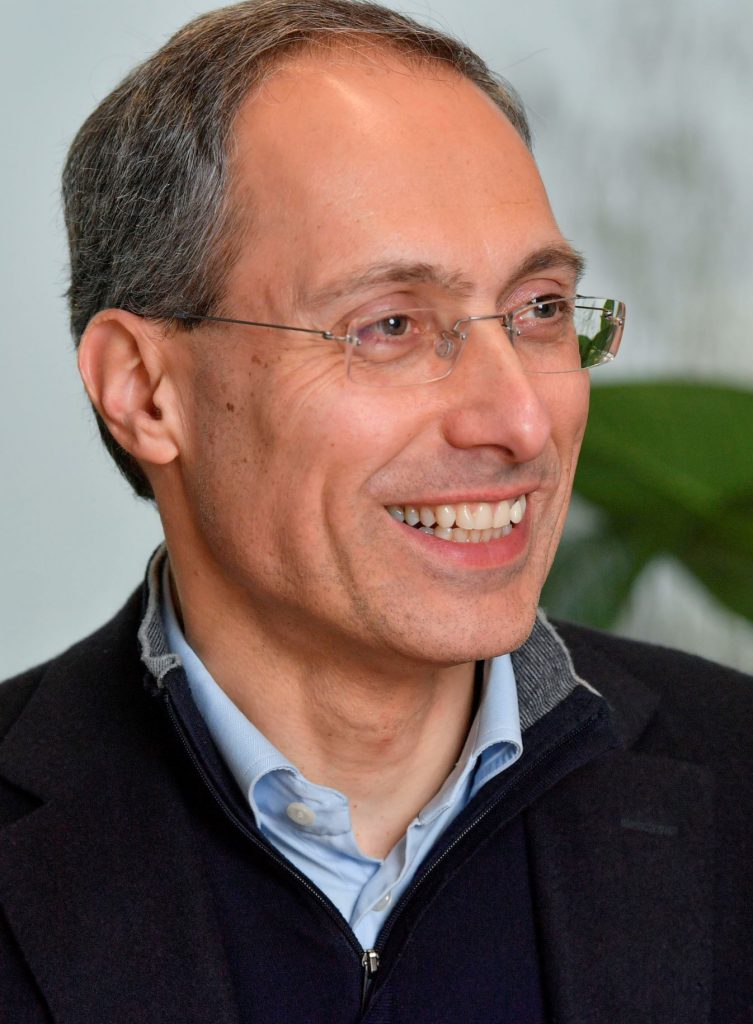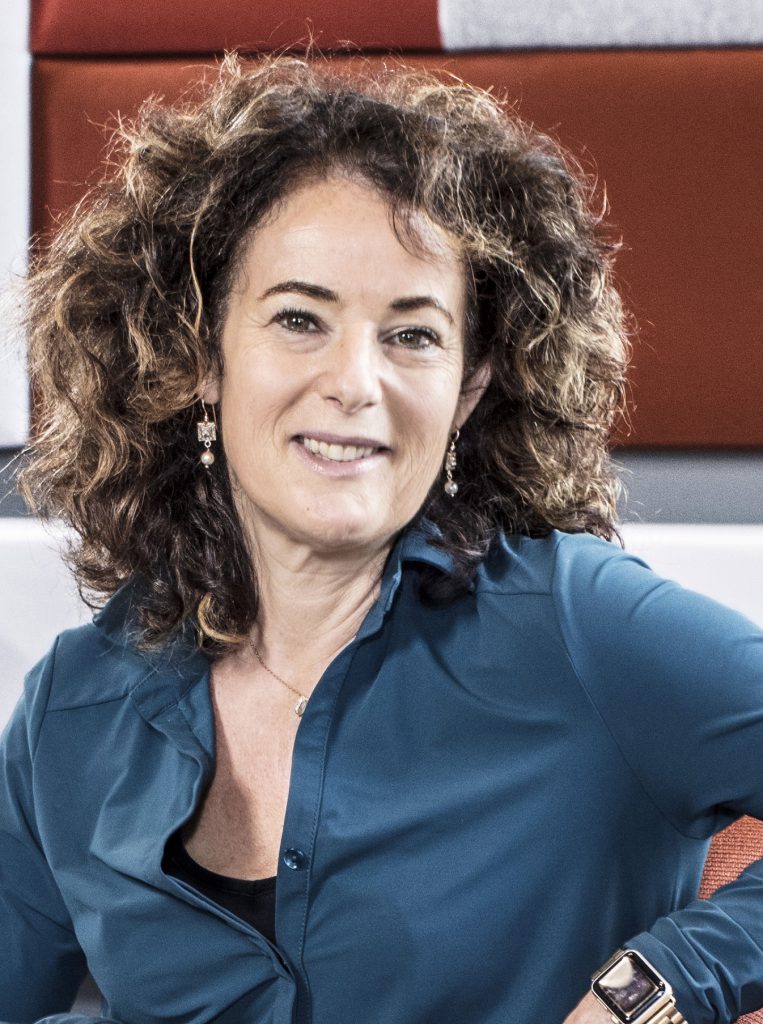Board Talk: ‘Ons energiesysteem is niet houdbaar, we móeten veranderen’
Een goede samenwerking tussen wetenschap en bedrijfsleven kan de energietransitie een flinke impuls geven. Een gesprek tussen Boardleden Mirjam van Praag en Yuri Sebregts. “Zonder dit soort samenwerkingen komen we gewoon niet door zulke grote dossiers heen.”
Hoe raakt de huidige crisis jullie beider organisaties?
Van Praag: “De coronacrisis treft de VU in ons hart. De afgelopen tijd vond 90 procent van ons onderwijs online plaats en we zijn nu hard bezig met de uitdaging om het onderwijs op de campus weer op te starten. We moeten ‘anderhalvemeteren’ en kunnen alleen buiten de spitstijden onderwijs op de campus geven, doordat er voor studenten beperkingen zijn opgelegd voor het reizen met ov. Dat is een behoorlijk lastige combinatie en we zijn dus flink aan het passen en meten. Het interessante is dat onze nieuwe strategie die we sinds begin dit jaar implementeren de ambitie adresseert om wendbaarder en flexibeler te worden. Dit is dus op zich een goede oefening.”
Sebregts: “Flexibel en wendbaar zijn inderdaad woorden die momenteel bij ons ook iedere dag ter sprake komen. De gevolgen van deze crisis zijn enorm. In de eerste plaats natuurlijk door de menselijke tragedie; we zijn collega’s verloren aan corona. Daarnaast raakt de economische krimp ons hard, alleen al doordat de brandstofverkoop flink is afgenomen. We proberen in ons technologiecentrum in Amsterdam het onderzoek zoveel mogelijk door te laten lopen. In plaats van 1.500 mensen zijn daar nu dagelijks zo’n 250 mensen, die alleen de meest essentiële laboratoriumwerkzaamheden doen. De rest van de medewerkers werkt vanuit huis. We kijken stap voor stap naar wat mogelijk is en passen ons daarop aan.”

Yuri Sebregts, Executive Vice President Innovation and R&D and Chief Technology Officer Royal Dutch Shell
Wat is volgens jullie het effect van deze crisis op de energietransitie in de Metropool Amsterdam?
Sebregts: “De enorme afname van het aantal verplaatsingen versnelt ook de afname van de vraag naar verplaatsingsenergie en ik vraag me af of deze op het oude niveau terugkomt. Daar staat tegenover dat de energietransitie voor heel veel organisaties nu tijdelijk niet de topprioriteit heeft die het wel had. Bedrijven, zowel grote als kleine, zijn nu vooral bezig met overeind blijven. Hoe dit uiteindelijk uitwerkt, moet blijken. En de vraag is of dat relevant is: we móeten veranderen, het huidige energiesysteem is op lange termijn niet houdbaar.”
“De energietransitie heeft voor veel organisaties nu tijdelijk niet de topprioriteit die het wel had.”
Van Praag: “Ik deel die analyse. Ik denk dat we nu noodgedwongen hebben ontdekt dat er veel minder verplaatsingen nodig zijn en dat dat blijvend kan zijn. Een ander interessant aspect hiervan is, nu dat blijkt dat verplaatsingen minder belangrijk zijn, onze wereld veel groter is geworden. Dat kan een positief effect hebben op de energietransitie, doordat we straks eerder kiezen voor spelers die de beste producten aanbieden, dan voor spelers dichtbij. Wat denk ik slecht is voor de energietransitie is dat de vertraging die er nu in het onderwijs en onderzoek is opgelopen effect heeft op het kennisniveau van mensen. Als er meerdere uitbraken komen dan is er straks minder kennis beschikbaar, voor allerlei zaken en dus ook voor de energietransitie. Daarom is het belangrijk dat het onderwijs zoveel mogelijk kan doordraaien.”
Welke rol speelt de energietransitie bij Shell en de VU?
Sebregts: “In ons technologiecentrum zijn we vrijwel met niets anders bezig. Dat spreekt voor zich, want ik werk bij een van de grootste energiebedrijven ter wereld. Het is een enorm dossier van een gigantische complexiteit. Voor sommige uitdagingen zijn al behoorlijk ver ontwikkelde oplossingen. Voor de elektrische auto is de techniek bijvoorbeeld al ver ontwikkeld en moeten we vooral nog werken aan de goede infrastructuur. Maar hoe een staalbedrijf als Tata staal moet maken met bijna geen CO2-uitstoot; daarvoor moet de technologie nog voor een groot deel bedacht worden. Met al die facetten van de energietransitie houden we ons in ons technologiecentrum bezig. Zo werken we aan een grote waterstoffabriek voor de Maasvlakte, waarmee we op den duur zwaar wegtransport kunnen voorzien van waterstof om zich te verplaatsen. Daarmee hopen we waterstof als energiedrager een extra impuls te geven. En samen met Eneco hebben we net een bod uitgebracht op een nieuw windpark op de Noordzee: Hollandse Kust Noord. De bedoeling is dat de windenergie die wordt opgewekt door dit windpark, de energie zal leveren voor de waterstoffabriek op de Maasvlakte.”
Van Praag: “Wij proberen op verschillende manieren bij te dragen aan de energietransitie. Duurzaamheid is een van de drie speerpunten van onze universiteit. Het is een onderzoeksgebied waar veel wetenschappers zich mee bezighouden en ook onze studenten laten we in hun opleidingen veel in aanraking komen met duurzaamheidsvraagstukken. Bijvoorbeeld in onze programma’s A Broader Mind en Community Service Learning waarin studenten en onderzoekers met maatschappelijke thema’s aan de slag gaan. Daarin ontwikkelen de deelnemers zichzelf én helpen ze de maatschappij. Ook bij ons Amsterdam Sustainability Institute, waarin zeven van onze faculteiten samenwerken, staat dit thema centraal. Een leuke primeur daarnaast is dat we samen met Naturalis en andere partijen gevorderde plannen hebben voor een centrum rondom het Antropoceen (de geologische aanduiding voor het tijdperk waarin we nu leven, red.), over de invloed van de mens op de wereld om ons heen. Daarin komen museum, onderzoek en onderwijs samen en hopen we ook samen te gaan werken met bedrijven.”

Mirjam van Praag, Voorzitter College van Bestuur Vrije Universiteit
Hoe kan de samenwerking tussen bedrijfsleven en wetenschap de energietransitie ondersteunen?
Van Praag: “Die samenwerking is onontbeerlijk. Er is een wisselwerking tussen maatschappij en kennisinstellingen nodig om tot goed onderzoek te komen. Alleen dan krijg je antwoorden die bijdragen aan maatschappelijke vraagstukken.”
Sebregts: “Daar ben ik het helemaal mee eens. Wetenschappers binnen bedrijven hebben zich vaak getraind in de praktische kant van hun vak en minder in de fundamentele en theoretische aspecten ervan. Dat betekent dat wetenschappers binnen bedrijven en universiteiten elkaar aanvullen. Wat hierbij ook een rol speelt is dat de energietransitie uit heel veel deeloplossingen bestaat. We zien in het maatschappelijk debat nu vaak partijen die op het pad van een deeloplossing zitten, en dat die soms de andere deeloplossing actief bestrijden. Dat moeten we doorbreken en daarvoor is samenwerking nodig. Tussen verschillende bedrijven, verschillende universiteiten, verschillende overheden, elk met hun eigen invalshoek. Dan ben je in gesprek over het totaal en ontstaat daaruit een breder draagvlak voor een combinatie van die deeloplossingen.”
Van Praag: “En wat we ook niet moeten vergeten is dat er ook veel bedrijven ontstaan vanuit wetenschappelijk onderzoek. Wij hebben hier een kraamkamer van dat soort bedrijven. Startups als Climecs en Veridis Instruments komen voort uit onderzoek, dat is heel mooi.”
Jullie brengen die samenwerking tussen wetenschap en bedrijfsleven al veelvuldig in de praktijk. Zo zijn jullie in mei, ook met de Universiteit van Leiden, een R&D-samenwerking gestart op het gebied van quantumcomputing. Wat zijn de do’s and don’ts van zo’n samenwerking?
Sebregts: “Bij de achterban van de verschillende partijen is er soms angst. Angst voor het verlies van academische vrijheid. Moet je de wetenschap wel voor commerciële doelen aanwenden? Bedrijven zijn soms bang hun intellectueel eigendom te verliezen, of bang dat er informatie weglekt naar de concurrent. Al die zorgen moeten we serieus nemen, maar ze moeten niet leiden tot een transactionele samenwerking die écht doorpakken in de weg staat. Dat vind ik nog wel een uitdaging. Mirjam, heb jij ideeën over hoe we zorgen wel kunnen adresseren, maar ze niet een bottleneck laten zijn?
“Yuri, zou je het leuk vinden te kijken naar hoe we een relationele samenwerking op het gebied van de energietransitie kunnen bewerkstelligen?”
Van Praag: “Die angst voor verminderde wetenschappelijke onafhankelijkheid is wat mij betreft al niet nodig. Een van de redenen waarom bedrijven met de wetenschap willen samenwerken ís juist die onafhankelijkheid. Het is in ieders belang dat wij onafhankelijk blijven. Yuri, zou je het leuk vinden om naar aanleiding van dit gesprek nog eens te kijken naar hoe we zo’n niet-transactionele, maar een relationele samenwerking op het gebied van de energietransitie kunnen bewerkstelligen?”
Sebregts: “Absoluut. Het is een uitdaging waarvan ik me bewust ben dat ik die op mijn niveau moet oppakken.”
Van Praag: “Ja, ik ook.”
Sebregts: “En dan moeten we dus ook de rug recht houden als er ergens anders in de organisatie twijfel over is. Want zonder dit soort samenwerkingen komen we gewoon niet door dit soort grote dossiers heen. Dus absoluut, bij deze. Beloofd!”
Tekst: Mirjam Streefkerk
Board Talk
Het interview met Mirjam van Praag en Yuri Sebregts is deel 4 uit de reeks Board Talk. Hierin praten we met Boardleden over de grootste uitdagingen voor de Amsterdamse metropool. Een regio die een duurzame, gezonde leefomgeving biedt, verantwoorde digitalisering en waardevol werk voor iedereen. Dit zijn ook de belangrijkste thema’s voor Amsterdam Economic Board. Lees ook de andere interviews in de serie Board Talk.
Wat de Board doet binnen de energietransitie
- Met ons initiatief LEAP staan we aan het begin van impactvolle veranderingen in de datacenterketen. Wil je meedoen met de LEAP coalitie en deelnemen aan een pilot, neem dan contact op met: Marjolein Bot.
- In het kader van de coronacrisis werkt de Board aan economisch herstel met respect voor de klimaatopgave. Lees hier hoe we dat doen.
- Lees meer over onze grootstedelijke uitdaging Energie.
- Lees meer over onze grootstedelijke uitdaging Mobiliteit.
Wil je voortaan ons laatste nieuws en de aankomende (online) events ontvangen? Volg ons op Twitter en LinkedIn en schrijf je in voor onze maandelijkse Board Update.
17 augustus 2020
Meer weten over
Neem contact op
Blijf jij ook op de hoogte?
8x per jaar nieuws en events uit de regio: schrijf je in voor de Board Update nieuwsbrief
Deel dit artikel
Wil je op de hoogte blijven?
Volg ons dagelijks op LinkedIn en schrijf je in voor de Board Update nieuwsbrief.
Lees ook deze berichten
- Een nieuwe lichting gedreven jongeren is aangetreden bij Young on Board, de ...
- Met de selectie van vier kanshebbers is de regionale voorronde van de ...
- Met meer dan 80 ondernemers, 40 investeerders en diverse dienstverleners bood LSH Capital Match ...
